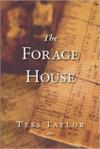When writing my first collection of poems, The Forage House (Red Hen, 2013), I had the privilege of spending a month in residence at the American Antiquarian Society. I was fresh out of my MFA at Boston University, newly minted as “a working poet,” though I didn’t fully know yet what that would come to mean for me. I was working on poems about history, and the American Antiquarian Society had invited me to come. I was moved by the AAS’s generous and generative vision of including artists alongside scholars, allowing for a cross pollination of ideas and disciplines.
In my month of study, I remember the invaluable patience of the librarians as I fumbled in a not quite scholarly way towards items I hardly knew how to describe— items whose very charm was in their ephemeral ghostly objectness. Sometimes these were pertinent to my research and sometimes I blundered towards discovery, or divagated into awe. I appreciated how much the staff supported me at all turns. I made many wonderful discoveries in the archives; I wrote many fragmented poems using the shards I encountered there.
The Forage House grew into an exploration both of a personal family history and a wider American history, which I was able to unearth (or not unearth) from the archive’s sheaves of Americana. Poems in The Forage House are about the ragged unevenness of archives, their imperfections, and the way that imperfection itself reflects the presence and absence in American history, what is recorded and what is not. This fragmented nature of recorded histories struck me throughout this project, as I unravelled family stories and historical records. Researching and exploring the archives at the American Antiquarian Society helped me to decode and confront these histories, and to think about the relations of history to poetry and to privilege and violence. I have not stopped thinking about those questions. I also remember the thrill of simply being in the presence of old and complex objects, whose presence implied a lost and complicated world.
It now seems that even more than finishing a book, I was also learning a means of working. I also did not yet know that I was learning a method of “reporting” and “researching” poems which would stand me in good stead and become a frame to which I have returned now for two decades. My work has continued in its fascination with archives— even last year I wrote a collection of poems based on the notebooks of Dorothea Lange. And this year, I was invited to join a group of scientists who are working on reading and quantifying the ecological significance of the old growth forests in Oregon— a different form of archive, and a different site where artists and scholars can meet to forge dialog.
The archival shard — the glimpse of the past, shimmering, reverberating, but asking us to interpret us in the present— is a good proxy for both what a poem is and also what a poem does. It lets us into a piece of a world, a part for the whole, by which we infer a wider set of meanings. At the AAS, I glimpsed some sense of how my career might move towards greater wholeness. I was also grateful, so grateful, to be in the presence of so many powerful reverberating parts.
Articles featuring The Forage House
A Poet Reckons With Her Inheritance: New York Times Blog Q & A with Tess Taylor
Poems Encounter the Absences in a Family's Long History: ZYZZYVA Q & A with Tess Taylor
